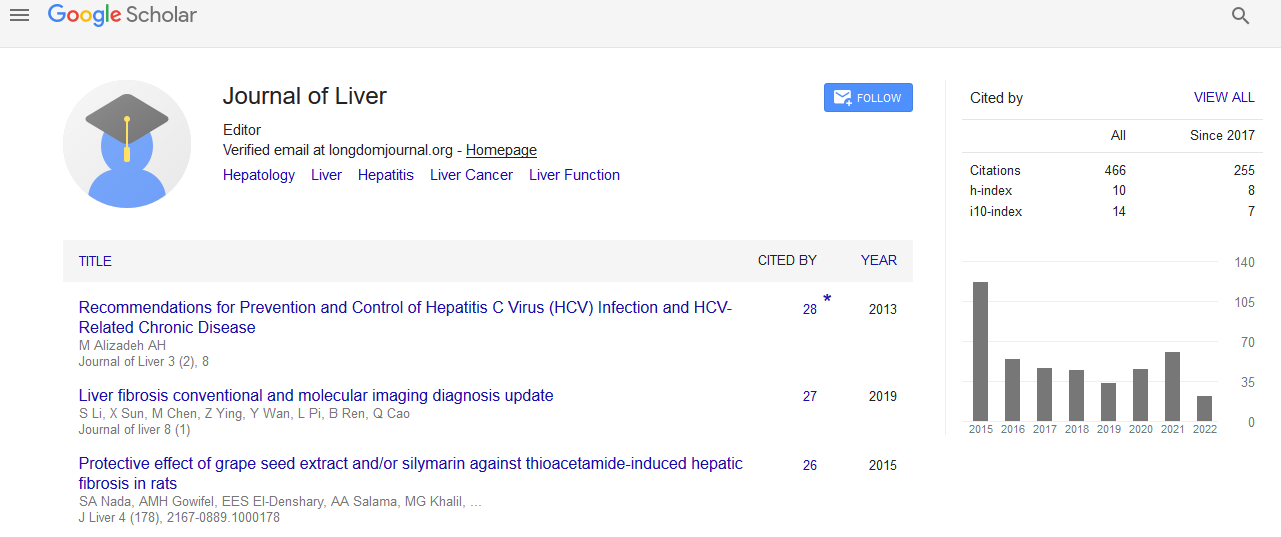PMC/PubMed Indexed Articles
Indexed In
- Open J Gate
- Genamics JournalSeek
- Academic Keys
- RefSeek
- Hamdard University
- EBSCO A-Z
- OCLC- WorldCat
- Publons
- Geneva Foundation for Medical Education and Research
- Google Scholar
Useful Links
Share This Page
Journal Flyer

Open Access Journals
- Agri and Aquaculture
- Biochemistry
- Bioinformatics & Systems Biology
- Business & Management
- Chemistry
- Clinical Sciences
- Engineering
- Food & Nutrition
- General Science
- Genetics & Molecular Biology
- Immunology & Microbiology
- Medical Sciences
- Neuroscience & Psychology
- Nursing & Health Care
- Pharmaceutical Sciences
Comparison of short-term and long-term outcomes after DCD and DBD donor liver transplantation
4th International Conference on Hepatology
April 27-28, 2017 Dubai, UAE
Wayel Jassem, Hector Vilca Melendez, Meriam Cortes, Krishna Menon, Yugesh Puri, John OGrady, Mohamed Rela and Nigel Heaton
King�??s College London, UK
Posters & Accepted Abstracts: J Liver
Abstract:
Introduction: Liver transplantation (LT) using donation after cardiac death (DCD) allografts has been increased; however the occurrence of primary non-function (PNF) and ischaemic cholangiopathy (IC) has curbed their expansion. Here, we compare the outcome of LT with donation after brain death (DBD) and DCD grafts performed in our institution. Study Design: Between 2001 and 2014, we carried out the study on 293 adult controlled DCD LT, which were compared to matched 293 DBD allografts. DCD grafts had a cut-off of maximum 30 min of warm ischaemia and were allocated to recipients with no previous extensive abdominal surgery. Results: There was no difference in gender and recipient�??s BMI between DBD and DCD transplants, however DBD donors were older and had longer cold ischaemic time. Patients who received DCD grafts presented higher levels of AST (p<0.0005), however, there was no significant difference in Intensive Care Unit or Hospital Stay between the 2 groups. PNF was significantly higher in DCD allografts (p<0.0005), nerveless; there was no statistically significant difference in the incidence of renal replacement therapy, rejection, biliary or vascular complications between the 2 groups. There were no significant differences in PIC occurrence between the 2 groups. Although more patients with hepatocellular carcinoma were allocated to a DCD graft, there was no difference in HCC recurrence. Overall patient and graft survival was higher in the DBD group (p=0.025, p=0.002). When transplants for HCC are excluded, no difference in overall patient and graft survival are observed. Conclusions: The data shows a favourable outcome of liver transplants using DCD allografts. More work is required to explore the impact of DCD status on HCC recurrence. Minimising CIT and optimising donor/recipient matching is crucial in order to achieve good outcome.
Biography :
Email: wayel.jassem@kcl.ac.uk

